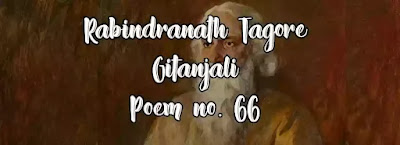Also Read
She who ever had remained in the depth of my being, in the twilight of gleams and of glimpses; she who never opened her veils in the morning light, will be my last gift to thee, my God, folded in my final song.
Words have wooed yet failed to win her; persuasion has stretched to her its eager arms in vain.
I have roamed from country to country keeping her in the core of my heart, and around her have risen and fallen the growth and decay of my life.
Over my thoughts and actions, my slumbers and dreams, she reigned yet dwelled alone and apart.
Many a man knocked at my door and asked for her and turned away in despair.
There was none in the world who ever saw her face to face, and she remained in her loneliness waiting for thy recognition.
Summary
The poem is again a devotional one. The fascinating characteristic of his poem is the whole-hearted thankfulness to God for His gifts and eternal bliss to man. Now the poet wants to devote his pure, innocent and virgin soul as his last gift to God in order to play his reverence to Him. The inner self, poetic soul of the poet is true, pure, devotional and devoid of all evils. His soul is like a virgin who dwells in the darkness of his true heart and doesn't show her face even to the morning light. She is too devotional and steadfast to unveil her face to anyone else except her lord, the Almighty. Flattery, persuasion and other evils try to seduce her but unable to do so. She is still true and pure. The poet has roamed from country to country, she accompanies him in the core of his heart. She is always with him in all stages of life whether its success, failure, growth, prosperity and destruction. She reigns over his thoughts and actions and yet remains apart, pure and untouched.
Many a man knocked at poet's door and asked for her but turned back with empty hands. The poet is never bought by the money of rich people. Many asked him to sell them his song but he refused to do so as this is his offering to God for His kindness, love and bliss offered to the poet. His poetic soul, his words, his love song for God is still hidden in his heart, unveiled and in loneliness and waiting for the moment of the arrival of her divine lover, and His acceptance of her love.
Critical Analysis
Tagore's Gitanjali purports to be "a collection of song offerings" to the creator. This great and complex work of art has one central theme besides a number of ideas and themes and that is purely devotional. It constantly expresses the yearning of the individual soul for reunion with the Infinite. The constant and intense yearning makes Gitanjali, "a mighty piece of prayer, pleading and exaltation." The lyric follows the tradition of Vaishnava devotional poetry of India. The mystic seeks to establish an immediate and intuitive relationship with the inner, ultimate reality. The mystics conception of ultimate bliss is union with God, this Indian concept of the Nirvana is lying in most of the lyrics of Tagore.
In this lyric the poet wants too offer his soul, his inner poetic self to the God. He knows that only purity steadfastness and true devotions are the ornaments of the soul with which he wants to adorn his soul to present it to God as an offering or a gift when the poet will leave this earth. His soul, the beloved of God wants to meet its lover the Supreme Power, God, to enjoy the bliss of the mystical ecstasy.
Annotations
Twilight: dim light. Gleam: shining. Glimpses: sights of. Veils: covering. Wooed: proposal Persuasion: the art of influencing mind of passions Core: centre, deepest part.
